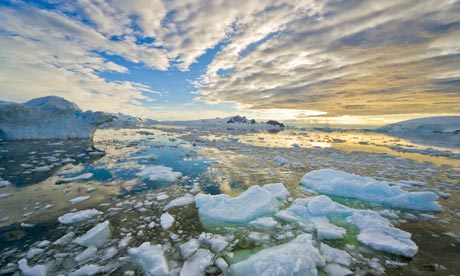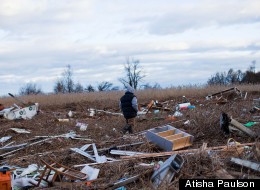This exploratory study was designed to assess air quality in a rural western Colorado area where residences and gas wells co-exist. Sampling was conducted before, during, and after drilling and hydraulic fracturing of a new natural gas well pad.
Weekly air sampling for 1 year revealed that the number of non-methane hydrocarbons (NMHCs) and their concentrations were highest during the initial drilling phase and did not increase during hydraulic fracturing in this closed-loop system.

 Environmental Glance
Environmental Glance The mystery of the expansion of sea ice around Antarctica, at the same time as global warming is melting swaths of Arctic sea ice, has been solved using data from US military satellites.
The mystery of the expansion of sea ice around Antarctica, at the same time as global warming is melting swaths of Arctic sea ice, has been solved using data from US military satellites. Filled with nostalgia for hot days and salty sweet Cracker Jacks, each year hundreds of thousands of baseball fans make the pilgrimage to this tiny village in the northern Catskill Mountains to celebrate America's oldest past time.
Filled with nostalgia for hot days and salty sweet Cracker Jacks, each year hundreds of thousands of baseball fans make the pilgrimage to this tiny village in the northern Catskill Mountains to celebrate America's oldest past time. Given the size and power of the storm, much of the damage from the surge was inevitable. But perhaps not all. Some of the damage along low-lying coastal areas was the result of years of poor land-use decisions and the more immediate neglect of emergency preparations as Sandy gathered force, according to experts and a review of government data and independent studies.
Given the size and power of the storm, much of the damage from the surge was inevitable. But perhaps not all. Some of the damage along low-lying coastal areas was the result of years of poor land-use decisions and the more immediate neglect of emergency preparations as Sandy gathered force, according to experts and a review of government data and independent studies. The U.S. Geological Survey is reporting that an earthquake centered in Kentucky also rattled other nearby states.
The U.S. Geological Survey is reporting that an earthquake centered in Kentucky also rattled other nearby states.
 A new report issued by Grassroots Environmental Education, a New York-based non-profit organization and authored by a former staff scientist for the National Council on Radiation Protection says that horizontal hydrofracking in the Marcellus Shale region of New York State is likely to produce significantly higher amounts of radioactive waste than previously believed, putting New Yorkers in danger, and that the New York State Department of Environmental Conservation has not demonstrated the ability to properly analyze the potential impact of radiation exposure or take adequate steps to protect the public.
A new report issued by Grassroots Environmental Education, a New York-based non-profit organization and authored by a former staff scientist for the National Council on Radiation Protection says that horizontal hydrofracking in the Marcellus Shale region of New York State is likely to produce significantly higher amounts of radioactive waste than previously believed, putting New Yorkers in danger, and that the New York State Department of Environmental Conservation has not demonstrated the ability to properly analyze the potential impact of radiation exposure or take adequate steps to protect the public. Climate scientists agree the Earth will be hotter by the end of the century, but their simulations don’t agree on how much. Now a study suggests the gloomier predictions may be closer to the mark.
Climate scientists agree the Earth will be hotter by the end of the century, but their simulations don’t agree on how much. Now a study suggests the gloomier predictions may be closer to the mark.






























